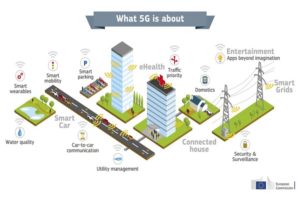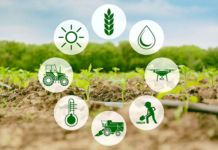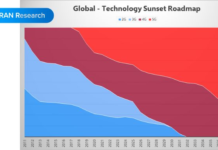
New ‘5G’ technologies could help to enable the growth of the ‘internet of things’ (IoT), as well as developments in smart energy, smart manufacturing, digital health and driverless cars, the UK’s telecoms regulator has said.
In a new update on 5G spectrum in the UK , Ofcom said that each of the new services and applications that 5G technology could enable will have “different performance requirements in terms of speed, coverage and reliability”, and that a number of different radio frequency bands will need to be made available for delivering 5G services.
According to Ofcom, the 700 MHz, 3.4 to 3.8 GHz and 26 GHz bands have been earmarked for supporting 5G services in Europe. It said that it wants at least one spectrum band to be identified for 5G services on a global, harmonised, basis “to facilitate a rapid development of a global ecosystem”.
Major decisions on the future allocation of spectrum are expected to be taken at the World Radio Conference in 2019. Ofcom said that the 26 GHz band “offers the most credible possibility to establish, ahead of WRC-2019, a global band for 5G”.
“Global availability is a primary objective: we see this as essential to provide the environment for a vibrant market in affordable consumer 5G devices,” it said.
Ofcom described the 26 GHz band as a “pioneer” band which would “give ultra-high capacity for innovative new services, enabling new business models and sectors of the economy to benefit from 5G”. It said it has already “initiated a program of work to develop proposals on how to make all or part of the 26 GHz band available for early 5G deployment in the UK” and intends to consult on the plans before July.
Ofcom said it will also publish a “UK roadmap” for a range of other frequency bands being considered for 5G by the middle of this year.
“We intend to establish our priorities for the different bands, based primarily on UK utilisation, the direction of travel and requirements for other services (other than 5G mobile access) and the chances for global harmonisation,” Ofcom said. “This may lead to us deprioritising and/or opposing consideration of certain bands for 5G where this use is clearly not in the UK interests. We expect to publish the roadmap by the middle of 2017 and will provide regular updates on this as the international work progresses towards WRC-19.”
The technical standards that will constitute ‘5G’ connectivity are still being developed.
Source: http://www.out-law.com


















